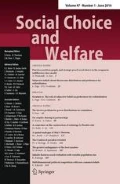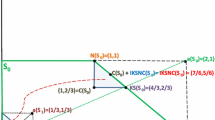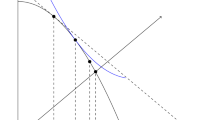Abstract
Suppes-Sen dominance or SS-proofness (SSP) is a commonly accepted criterion of impartiality in distributive justice. Mariotti (Review of Economic Studies, 66, 733–741, 1999) characterized the Nash bargaining solution using Nash’s (Econometrica, 18, 155–162, 1950) scale invariance (SI) axiom and SSP. In this article, we introduce equity dominance (E-dominance). Using the intersection of SS-dominance and E-dominance requirements, we obtain a weaker version of SSP (WSSP). In addition, we consider α − SSP, where α measures the degree of minimum acceptable inequity aversion; α − SSP is weaker than weak Pareto optimality (WPO) when α = 1. We then show that it is still possible to characterize the Nash solution using WSSP and SI only or using α -SSP, SI, and individual rationality (IR) only for any \({\alpha \in [0,1)}\). Using the union of SS-dominance and E-dominance requirements, we obtain a stronger version of SSP (SSSP). It turns out that there is no bargaining solution that satisfies SSSP and SI, but the Egalitarian solution turns out to be the unique solution satisfying SSSP.
Similar content being viewed by others
References
Anbarci N (1993) Noncooperative foundations of the area monotonic solution. Q J Econ 108: 245–258
Anbarci N (1995) Reference functions and balanced concessions in bargaining. Can J Econ 28: 675–682
Anbarci N, Bigelow J (1994) The area monotonic solution to the cooperative bargaining problem. Math Soc Sci 28: 133–142
Aumann RJ, Maschler MB (1985) Game-theoretic analysis of a bankruptcy problem from the Talmud. J Econ Theory 36: 195–213
Bigelow J, Anbarci N (1993) Non-dictatorial, Pareto-monotonic, cooperative bargaining: an impossibility theorem. Eur J Political Econ 9: 551–558
Chun Y (1988) The equal-loss principle for bargaining problems. Econ Lett 26: 103–106
Horn R, Johnson C (1990) Matrix analysis. Cambridge University Press, Cambridge
Kalai E (1977) Proportional solutions to bargaining situations: interpersonal utility comparisons. Econometrica 45: 1623–1630
Kalai E, Smorodinsky M (1975) Other solutions to Nash’s bargaining problem. Econometrica 43: 513–518
Mariotti M (1999) Fair bargains: distributive justice and Nash bargaining theory. Rev Econ Stud 66: 733–741
Moulin H (1988) Axioms of cooperative decision making. Cambridge University Press, Cambridge
Nash JF (1950) The bargaining problem. Econometrica 18: 155–162
Perles MA, Maschler M (1981) The super-additive solution for the Nash bargaining game. Int J Game Theory 10: 163–193
Roth A (1979) Proportional solutions to the bargaining problem. Econometrica 47: 775–778
Sen A (1970) Collective choice and social welfare. Holden-Day, San Francisco
Young P (1995) Equity: in theory and practice. Princeton University Press, Princeton
Author information
Authors and Affiliations
Corresponding author
Rights and permissions
About this article
Cite this article
Anbarci, N., Sun, Cj. Distributive justice and the Nash bargaining solution. Soc Choice Welf 37, 453–470 (2011). https://doi.org/10.1007/s00355-010-0499-9
Received:
Accepted:
Published:
Issue Date:
DOI: https://doi.org/10.1007/s00355-010-0499-9




